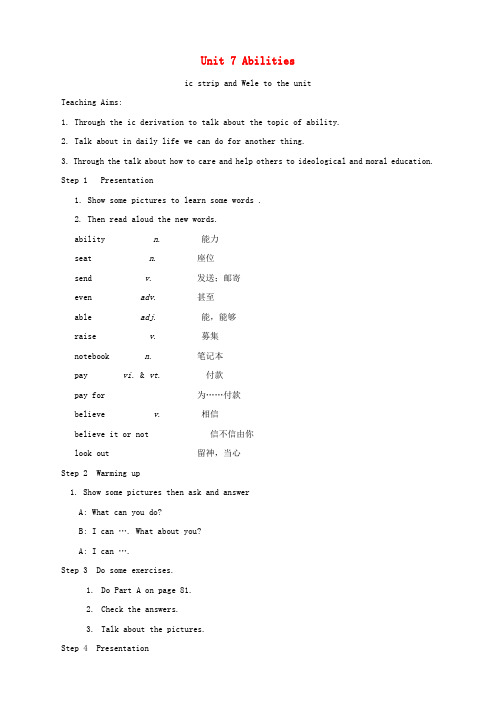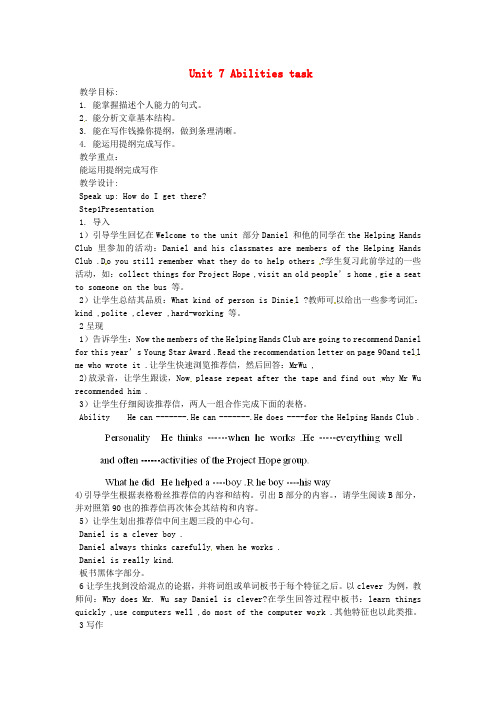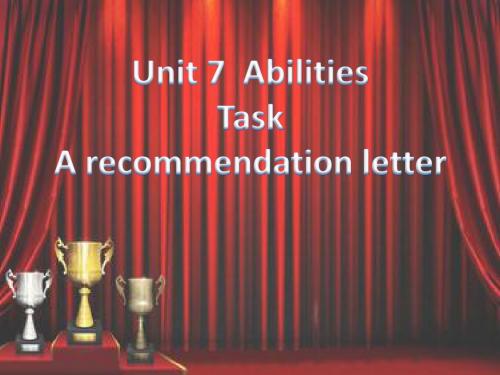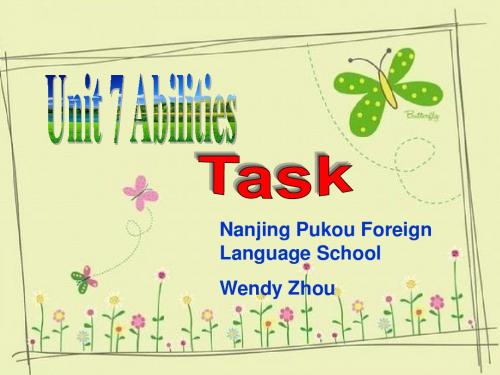七年级英语下册 7B Unit 7 Abilities Task教学案 牛津版
- 格式:doc
- 大小:53.50 KB
- 文档页数:3

牛津译林版英语七下Unit 7《Abilities》说课稿2一. 教材分析牛津译林版英语七下Unit 7《Abilities》是本单元的最后一个单元,主要讲述了关于能力的话题。
本课的主题是讨论不同人的不同能力,以及如何正确评估和使用自己的能力。
教材通过丰富的语言环境,引导学生运用目标语言进行交流,提高他们的语言运用能力。
二. 学情分析学生在学习本课之前,已经掌握了基本的英语语法和词汇,具备了一定的听说读写能力。
但学生在语言运用方面还存在一定的问题,如:表达能力不足,语法运用不准确等。
因此,在教学过程中,需要关注学生的个体差异,因材施教,提高他们的语言运用能力。
三. 说教学目标1.知识目标:学生能够掌握本课的主要词汇和句型,理解课文内容。
2.能力目标:学生能够在真实语境中运用目标语言进行交流,提高他们的语言运用能力。
3.情感目标:学生能够培养对不同能力的尊重和欣赏,树立正确的价值观。
四. 说教学重难点1.教学重点:学生能够掌握本课的主要词汇和句型,理解课文内容。
2.教学难点:学生能够在真实语境中运用目标语言进行交流,特别是语法和表达能力的运用。
五. 说教学方法与手段1.教学方法:采用任务型教学法,让学生在完成任务的过程中,运用目标语言进行交流,提高他们的语言运用能力。
2.教学手段:利用多媒体教学资源,如:图片、视频等,丰富教学内容,激发学生的学习兴趣。
六. 说教学过程1.导入:通过展示一张图片,引导学生谈论图片中的人物和他们的能力,激发学生的学习兴趣。
2.新课呈现:教师展示课文图片,引导学生观察并回答相关问题,引入本课的主题。
3.单词学习:学生通过听、说、读、写的环节,掌握本课的主要词汇。
4.句子练习:学生通过模仿、角色扮演等环节,掌握本课的主要句型。
5.小组讨论:学生分小组讨论,运用目标语言谈论自己的能力和梦想,培养他们的合作意识和语言运用能力。
6.课堂展示:学生代表上台展示小组讨论的结果,其他学生进行评价和补充。

Unit 7 Abilitiesic strip and Wele to the unitTeaching Aims:1. Through the ic derivation to talk about the topic of ability.2. Talk about in daily life we can do for another thing.3. Through the talk about how to care and help others to ideological and moral education. Step 1 Presentation1. Show some pictures to learn some words .2. Then read aloud the new words.ability n. 能力seat n. 座位send v. 发送;邮寄even adv. 甚至able adj. 能,能够raise v. 募集notebook n. 笔记本pay vi. & vt.付款pay for 为……付款believe v. 相信believe it or not 信不信由你look out 留神,当心Step 2 Warming up1. Show some pictures then ask and answerA: What can you do?B: I can …. What about you?A: I can ….Step 3 Do some exercises.1.Do Part A on page 81.2.Check the answers.3.Talk about the pictures.Step 4 PresentationShow some pictures present ic strip.Step 5 Listen and answer1. Can Eddie fly?2. Read the dialogue in pairs.3. Act it out.Step 6 Listening1. Listen to part B and answer the following question.1) What can they do for the children in poor areas?2) Can they raise some money for them?2. Read after the recorder.3. Pratice in pairs.4. Act it out.5. Make their own dialogue.Step 7 Explanation1. How cool! 多酷呀!这是一个感叹句。

Unit 7 Abilities task教学目标:1. 能掌握描述个人能力的句式。
2. 能分析文章基本结构。
3. 能在写作钱操你提纲,做到条理清晰。
4. 能运用提纲完成写作。
教学重点:能运用提纲完成写作教学设计:Speak up: How do I get there?Step1Presentation1. 导入1)引导学生回忆在Welcome to the unit 部分Daniel 和他的同学在the Helping Hands Club 里参加的活动:Daniel and his classmates are members of the Helping Hands Club .D o you still remember what they do to help others ?学生复习此前学过的一些活动,如:collect things for Project Hope ,visit an old people’s home ,gie a seat to someone on the bus 等。
2)让学生总结其品质:What kind of person is Dinie l ?教师可以给出一些参考词汇:kind ,polite ,clever ,hard-working 等。
2呈现1)告诉学生:Now the members of the Helping Hands Club are going to recommend Daniel for this year’s Young Star Award .Read the recommendation letter on page 90and tel l me who wrote it .让学生快速浏览推荐信,然后回答:MrWu ,2)放录音,让学生跟读,Now please repeat after the tape and find out why Mr Wu recommended him .3)让学生仔细阅读推荐信,两人一组合作完成下面的表格。

牛津译林版七年级下册Unit 7《Abilities》(Period 7)教学设计一. 教材分析牛津译林版七年级下册Unit 7《Abilities》(Period 7)主要讲述了一个关于寻找丢失物品的故事。
本节课的主要内容包括:词汇(如hospital, police等),语法(一般过去时态),以及听力、口语、阅读和写作技能的训练。
通过本节课的学习,学生能够掌握相关词汇和句型,并运用一般过去时态描述过去发生的事情。
二. 学情分析七年级的学生已经掌握了一些基本的英语语法和词汇,但对一般过去时态的运用还不够熟练。
学生在听力、口语、阅读和写作方面有了一定的基础,但还需要进一步的训练和提高。
此外,学生对寻找丢失物品的情境感兴趣,有利于激发他们的学习积极性。
三. 教学目标1.知识目标:学生能够掌握本节课的生词和短语,理解并运用一般过去时态描述过去发生的事情。
2.能力目标:学生能够在实际情境中运用所学知识进行交流,提高听、说、读、写的能力。
3.情感目标:学生能够培养对英语学习的兴趣,增强团队合作意识。
四. 教学重难点1.重点:学生掌握一般过去时态的运用。
2.难点:学生能够在实际情境中灵活运用一般过去时态进行交流。
五. 教学方法1.情境教学法:通过设置寻找丢失物品的情境,让学生在实际语境中学习和运用英语。
2.任务型教学法:引导学生参与各种小组活动,提高学生的合作能力和实际应用能力。
3.交际法:鼓励学生大胆开口,进行真实的交流。
六. 教学准备1.教材:牛津译林版七年级下册Unit 7《Abilities》(Period 7)2.多媒体设备:电脑、投影仪、音响等3.教学课件:包括图片、音频、视频等4.学生活动材料:小组活动记录表、听力材料等七. 教学过程1.导入(5分钟)利用图片和问题引导学生回顾以前学过的关于寻找丢失物品的情境,激发学生的兴趣。
例如:“你们还记得我们以前学过的小故事吗?今天我们将学习一个新的故事,故事中会发生什么有趣的事情呢?”2.呈现(10分钟)展示课文图片,引导学生观察并回答问题。


牛津译林版英语七下Unit 7《Abilities》(Skills+Speak up)教学设计一. 教材分析牛津译林版英语七下Unit 7《Abilities》(Skills+Speak up)主要讨论了人们在学习新技能时所面临的挑战以及如何克服这些挑战。
本单元包括三个部分:Skills,Speak up以及附加练习。
Skills部分通过一个关于四位学生在学习舞蹈、绘画、乒乓球和篮球过程中所遇到的困难以及如何克服这些困难的故事,引导学生学习并运用情态动词must,can,may和will表示能力。
Speak up部分则提供了一个关于招聘面试的场景,让学生在实际语境中运用所学知识。
附加练习则是对本单元所学内容的巩固和拓展。
二. 学情分析七年级的学生已经掌握了一定的英语基础,能听懂并基本表达日常生活中的简单事物和情感。
但是,他们在学习过程中对新知识的理解和运用仍有一定难度,需要教师的引导和激励。
针对这一学情,教师在教学过程中应注重激发学生的学习兴趣,鼓励他们积极参与课堂活动,并通过有效的教学手段帮助他们理解和运用所学知识。
三. 教学目标1.知识目标:学生能掌握情态动词must,can,may和will的用法,正确表达自己的能力和需求。
2.能力目标:学生能在实际语境中运用所学知识进行交流,提高自己的英语口语表达能力。
3.情感目标:学生能认识到学习新技能的重要性,培养积极的学习态度,勇于面对挑战。
四. 教学重难点1.重点:情态动词must,can,may和will的用法及其在不同语境中的表达。
2.难点:正确运用情态动词表达自己的能力和需求,以及在实际语境中进行流畅的交流。
五. 教学方法1.任务型教学法:通过设置各种实际任务,让学生在完成任务的过程中运用所学知识,提高口语表达能力。
2.情境教学法:创设各种真实的学习情境,让学生在实际语境中感知和运用语言。
3.激励教学法:注重鼓励和表扬学生,激发他们的学习兴趣和自信心。
牛津译林版英语七下Unit 7《Abilities》教学设计3一. 教材分析牛津译林版英语七下Unit 7《Abilities》主要讲述了关于能力的话题,通过一系列日常生活中的情境,让学生学会如何运用一般现在时描述自己的能力和他人的能力。
本单元的关键语法点是一般现在时,学生需要掌握一般现在时的构成、用法和动词形式的变化。
此外,学生还需要掌握如何用一般现在时表达推测和能力。
二. 学情分析七年级的学生已经掌握了基本的英语语法知识,对一般现在时有所了解,但可能在实际运用中还存在一定的困难。
学生在词汇和阅读方面已经有了一定的基础,但在口语表达和听力理解方面还有待提高。
因此,在教学过程中,需要注重激发学生的学习兴趣,提高他们的口语表达能力和听力理解能力。
三. 教学目标1.知识目标:–掌握一般现在时的构成和用法;–学会用一般现在时表达推测和能力;–掌握本单元的重点词汇和短语。
2.能力目标:–提高学生的口语表达能力和听力理解能力;–培养学生的团队合作意识和解决问题的能力。
3.情感目标:–激发学生学习英语的兴趣;–培养学生的自信心和自主学习能力。
四. 教学重难点1.教学重点:–一般现在时的构成和用法;–用一般现在时表达推测和能力;–重点词汇和短语的掌握。
2.教学难点:–一般现在时的运用和实际语境中的运用;–动词形式的变化和运用。
五. 教学方法1.情境教学法:通过设定各种日常生活中的情境,让学生在实际语境中学习和运用英语。
2.交际教学法:通过小组讨论、角色扮演等活动,让学生在实际交流中提高口语表达能力和听力理解能力。
3.任务型教学法:通过完成各种任务,让学生在实践中学习和运用英语。
4.激励评价法:注重鼓励和表扬学生,激发他们的学习兴趣和自信心。
六. 教学准备1.教材:牛津译林版英语七下Unit 7《Abilities》课本和练习册。
2.多媒体设备:电脑、投影仪、音响等。
3.教学素材:相关图片、视频、录音等。
4.教学卡片:重点词汇和短语的卡片。
七年级下册英语Unit 7 Abilities教案(牛津版)七年级下册英语Unit 7 Abilities教案(牛津版)Unit 7 Abiland WeluTeaching Aims:Talk about your abil2. Talk about what we can dPresentawures to leaword2. Then read aloud the new word2 Warming uwuask and answA: What can you do?B: I can …. What about you?A: I can …Pand answer the qu) What does Eddie want to be?He wants to be Superdog.2) What does Eddie want to do?He wal) What does Hobo say when Eddie waly?He says, “Look out, Eddie!”4) Can Eddie fly? Anduperdog?No, he can’t fly. He isn’t Superdog.2. Act out the dialoguPair wWairs. Discuss what you can d2. Finish Part A on paganswTalk abouuListeningLart B and answllowing qu) Who’lllp?2) What’ll they dldren?2. Pair wuu’re membHelping Hands Club. Who are you going to help? What can you do to helpthem?LanguagHow cool! 多酷呀!这是一个感叹句。
它的结构是 how + adj./adv. + 主语 + 谓语!g. How beautiful she is!How fauns!2. I can fly. 我会飞。
(课题): 7B Unit 7 Abilities
( task )
教学目的:
1.Recite:most of the computer work take part in lose one’s way
Hear from
I would like to recommend … for this year’s Young Star Award
We look forward to .
Yours faithfully
2. Learn: letter
3. Grasp: the expressions of recommending others.
教学重难点:
1. How to write a recommendation letter
教学过程:
Step 1 Greeting
Step 2 Review
1.Do some translation related to Reading part.
2.ask two students to retell what Lintao did to
Step3 Preview
1. Recite the words from page 90.
2. Try to write a recommendation letter
Step 4 Lead-in
1.引导学生回忆在 welcome to the unit 部分Daniel 和他的同学在 the Helping Hands Club 里参加的活动;Daniel and old people’s Home give a seat to someone on the bus 等。
2,。
What kind of person is Daniel? 教师给参考词汇( kind, polite, clever,
1. T: Now the members of the Helping Hands Club are going to recommend Daniel for this year’s Young Star Award. Read the letter on page 90 and tell me who wrote it.
2.Play the tape, and ask students to read after the tape.
Answer: Why did Mr. wu recommend Daniel?
3. Ask students to read part B on P 90
Find out the main sentence of each paragraph:
Daniel is a clever boy.
Daniel always thinks carefully when
1.Group work
Group students into group of four and talk about outline
2. write their own essay.
Some useful words:
Lively ’t ________my parents 1ast month.
A. forgot to bring ’t C.can’t D.can
( )4.We are looking forward________you soon.
A.to see B.seeing C.will see D.to seeing
( )5.一Why did the little boy cry? 一He_________.
A.lose find the way
( )6.He stayed with the boy and_________with do__________ the way B.in your way C.on your way to D.on your way
( ) 8. I B. on C. at D. from
( ) 10. He ________ very busy this week, but ’t. D. That’s all right.
三、用所给词的适当形式填空
1.Were you good at____________(play) tennis last year?
2._________ (smoke)is bad for your such a big city.
4.She is a clever girl.She can think_________ (quick).
5.This afternoon,I’ll go to the _________ (dance)lesson.
6.I want Jack __________(teach) me to sing.
7.Look! How cool blue
8.__________ (swim)alone is dangerous.
9.Do you the UK.
They _____________ ___________ in the UK.
2. He can’t speak Japanese.
He _________ _________ _________ _________speak Japanese.
3.Did you your parents yesterday?
Did you _________ _________ ________ from your parents yesterday?
4. What a clever boy Daniel is!
_________ ___________ Daniel is!
5. He looked after the baby well last week.
He ________ __________ __________ __________ the baby.
五、书面表达:
请根据提示写一封推荐信。
假如你是Kate,你想推荐Daniel获得今年的青年奖。
他学东西很快,他很,的男孩,他能把每件事都计划得好好的。
上周在他去俱乐部的途中,送一个五岁的女孩回家。
所有人都认为他应该得这个奖。
Dear SirMadam
Youth Award for Daniel
I would like to recommend______________________________________________
___________________________________________________________
___________________________________________________________________________________________ ___________________________________________________________________________________________ ___________________________________________________________________________________________ ___________________________________________________________________________________________ ____________________________________________
Yours faithfully
Kate。